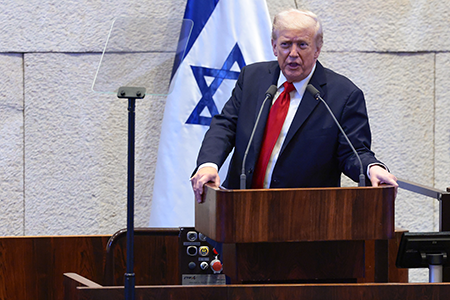Iran Nuclear Talks Stalled After Sanctions Reimposed
November 2025
By Kelsey Davenport
Iran and the United States expressed support for negotiating a nuclear deal after the UN Security Council reimposed sanctions and nuclear restrictions on Iran, but neither government appears willing to take the first step to begin talks.

Following the Sept. 28 reimposition of Security Council resolutions targeting Iran’s nuclear program that were waived as part of the 2015 nuclear deal, U.S. President Donald Trump said the United States is ready to make a deal when Iran is ready. Trump, in an Oct. 13 address to the Israeli Knesset, said that the “hand of friendship and cooperation is open” to Iran and it would be “great … if we could make a peace deal.”
Two days earlier, Iranian Foreign Minister Abbas Araghchi told state television that Iran would consider a “reasonable, balanced, and fair proposal,” but he noted that Tehran has not received any communication from Washington about the basis for resuming nuclear talks, Reuters reported.
The United States has said little about its negotiating position and how it would approach talks, aside from Trump’s continued demands that Iran forgo uranium enrichment as part of a deal. The reimposition of UN restrictions in September and Israeli and U.S. military strikes on Iran in June have complicated the political dynamics.
Iran is not currently enriching uranium since the illegal U.S. and Israeli strikes damaged its enrichment facilities in June, but Tehran has doubled down on its position that any nuclear agreement must allow domestic enrichment in the wake of the attacks. (See ACT, July/August 2025.)
Iranian Supreme Leader Ayatollah Ali Khamenei also suggested that Iran will not accept a deal if the Trump administration expects Iran to capitulate to U.S. demands. If “a deal is accompanied by coercion and its outcome is predetermined, it is not a deal but rather imposition and bullying,” he said during an Oct. 18 meeting with state officials.
Iran also has rejected further negotiations with France, Germany, and the United Kingdom, known as the E3, after those states triggered the mechanism known as “snapback” that led to the reimposition of UN sanctions Sept. 28 on Iran. Snapback allowed the E3 to reinstate the Security Council restrictions and sanctions on Iran that were lifted as a part of the 2015 nuclear deal using a process that cannot be blocked.
The Europeans attempted to negotiate a delay to snapback but could not bridge the gap between the U.S. and Iranian positions. (See ACT, October 2025.)
In an Oct. 10 statement, the Europeans said they are “determined to reinitiate negotiations with Iran and the United States towards a comprehensive, durable and verifiable agreement that ensures Iran never acquires a nuclear weapon.”
But Araghchi said in an Oct. 11 interview televised on Iranian state-run media that Iran has no reason to negotiate with the E3, given their decision to trigger snapback.
Without ongoing talks, there is an increased risk that conflict between Iran and Israel and the United States re-erupts, particularly because Iran is refusing to allow the International Atomic Energy Agency (IAEA) to access sites that were bombed in June. Without access and an accounting of Iran’s stockpile of nuclear materials, it remains unclear how much of Iran’s nuclear program survived and how quickly Iran could rebuild.
Israeli Prime Minister Benjamin Netanyahu has continued to reiterate that Iran’s stockpile of enriched uranium “must be eliminated.” He told the UN General Assembly Oct. 1 that Iran cannot be allowed to rebuild its “military nuclear capabilities.”
IAEA Director-General Rafael Mariano Grossi said Oct. 22 in an interview with the Swiss paper Neue Zürcher Zeitung that the agency believes that “most of the highly enriched uranium remains at Esfahan, Natanz, and Fordow.”
The IAEA still has not accessed the sites damaged in the strikes, despite Iran’s legal obligation under the nuclear Nonproliferation Treaty (NPT) to allow the agency to conduct safeguards inspections. After the IAEA and Iran made progress toward restoring access to the inspectors at a meeting in Cairo in September, Iran suspended that agreement in response to the sanctions snapback.
Despite the suspension, Iran does not appear to have cut all ties with the IAEA. Grossi said in the Oct. 22 interview that Iran is “only allowing inspectors in dribs and drabs.” Grossi may be referring to access to Bushehr, Iran’s operating nuclear power plant, where Tehran allowed some inspections after the June strikes.
Ali Larijani, Secretary of Iran’s Supreme National Security Council, said Oct. 20 that if the IAEA offers a proposal for safeguards, Iran will review it. According to a law passed after the June strikes, the council must approve any IAEA access.
Iran’s failure to implement safeguards could complicate negotiations if talks resume and the parties do not have accurate inventories of what remains of Iran’s nuclear program. Another challenge could stem from Iran’s claim that its nuclear file is no longer open for continuous review at the Security Council.
Under the terms of the 2015 nuclear deal and UN Security Council Resolution 2231, which endorsed the deal, Oct. 18 was “termination day,” which would have marked the closure of Iran’s nuclear file at the Security Council.
In an Oct. 18 joint statement, China, Iran, and Russia said that the E3 move to reimpose sanctions was “legally and procedurally flawed” and that Oct. 18 “marks the end of the Security Council’s consideration of the Iranian nuclear issues.”
All of Resolution 2231’s provisions “are terminated,” they said.
If states, including China and Russia, ignore their legally binding obligations as UN member states to enforce the sanctions and restrictions, it will be more challenging for the United States to increase pressure on Iran and demand that Tehran agree to zero enrichment as part of any agreement.
